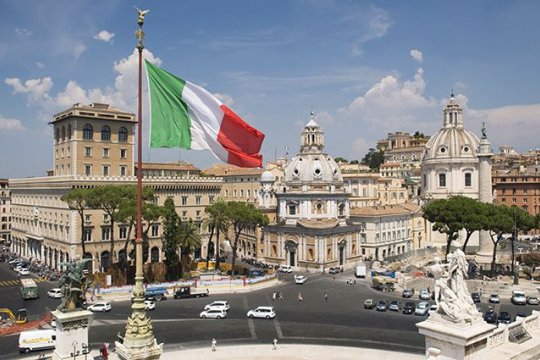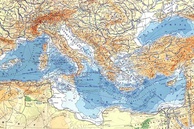The Mediterranean serves as a platform for Rome’s geopolitical efforts in the region which are aimed at creating a powerful configuration of strength that would leave the three main vectors of Italy’s foreign policy – the southern (directed at North Africa), the western (directed at the Atlantic) and the eastern (directed at the Balkans) – open and easy of access.
The Gibraltar, the Bosporus, the Suez Canal, the Bab el-Mandeb Strait – the world’s busiest transport arteries - acquire a particular strategic importance for Italy as a Mediterranean power.
The so-called geopolitical theory of “extended Mediterranean” was devised recently to justify Italy’s right to secure its presence in these regions (1). This theory is designed to put an end to the narrow perception of the Mediterranean Region as a space bounded by access to the sea and, accordingly, with a limited role of Italy.
Rome has conceptually “expanded” the Mediterranean at the expense of the adjacent Atlantic and land areas, having included the Sahel, the Middle East and the Arabian Peninsula. Thereby, Italy has assumed a “greater” geopolitical role in the region as a country whose economic stability depends on the stability of the territories adjacent to the Mediterranean region.
First of all, this refers to troubled countries, such as Libya, Algeria and Tunisia, which supply Italy with gas. Italy’s intention to politically establish itself in the Sahel as part of the “expanded Mediterranean” was dictated by the desire to create a controlled space in the rear of Libya, Tunisia and Algeria to prevent their further destabilization.
Italy is among the top six EU countries with highly developed sea trade. According to Eurostat, in 2016 this figure was 61% (of which 66.6% were imports and 55.9% were exports). By this indicator, Italy loses to Portugal (81%), Cyprus (80%), Greece (77%), Spain (74%) and Malta (67%). None of Italian ports is included in the ten busiest EU trade harbors. The Italian authorities intend to change this situation.
Under the EU parameters, maritime trade accounts for 51% of overall trade, of which 53% is export and 48% is import. 19% of the global sea traffic and 30% of oil haulage pass through the Mediterranean Sea (an increase of 120% over the past 16 years). 65% of all energy resources are delivered to Europe by the Mediterranean. As these indicators tend to show an upward trend, Italy is set on ensuring a more pronounced economic and political presence in the Mediterranean (2).
Given the situation, the Italian diplomacy face the following agenda in the region:
- to promote an equal distribution of power among top players in the Mediterranean in order to avoid any imbalance, be it in favor of countries that have no binding agreements or strategic cooperation agreements with Rome, or in favor of states whose political, military and economic potential is equal to that of Italy (France, Spain), or exceeds it (Germany);
- strengthen the political and economic presence of Italy in areas designated as the “extended Mediterranean”, thereby ensuring the participation of the Italian fleet in international anti-piracy missions;
to promote the peaceful settlement of current conflicts in the region (Syria, Iran, the Cyprus problem) with a view to prevent a buildup of other countries’ military presence within Italy’s strategic interest zone;
- to promote the diversification of energy supplies with due regard for Italy’s 77% dependence on external supplies, to initiate the development of gas and oil fields in Libya, Algeria, Egypt (Rome plans to invest € 175 billion in the development of the energy sector and related environmental projects by 2030.)
- to contribute to the transformation of Italy, located at the junction of sea routes from North Africa, the Persian Gulf and the Caspian Sea, into a leading transport and distribution hub of oil and gas exports and imports for the EU (4);
- to prevent the weakening of Italy’s positions in the EU in case of the strengthening of the Berlin-Paris axis, which will not be easy to achieve amid the emerging conflict between Brussels and Rome over the Italian budget.
The opinion of the author may not coincide with the position of the Editorial Board.
1) https://interaffairs.ru/news/show/20337
2) http://www.marina.difesa.it/conosciamoci/editoria/marivista/Pagine/default.aspx
3) http://www.occhidellaguerra.it/la-strategia-energetica-italiana-europa-mediterraneo/
read more in our Telegram-channel https://t.me/The_International_Affairs

 15:14 13.12.2018 •
15:14 13.12.2018 •



























